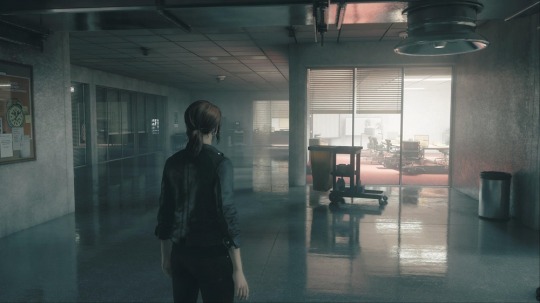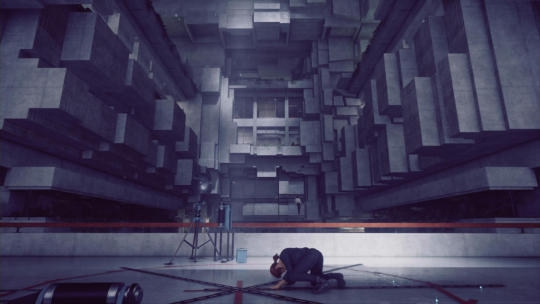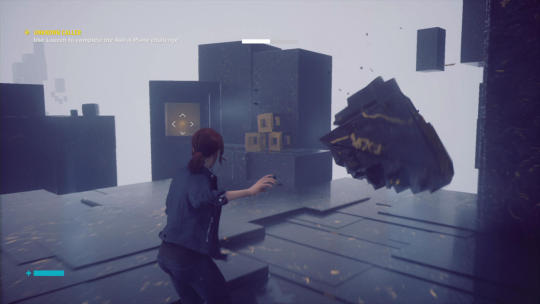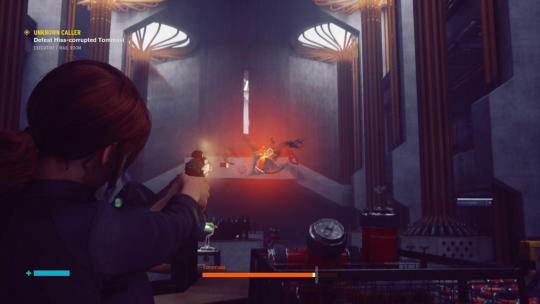#Clu's is closer to brutalist architecture or minimalism
Explore tagged Tumblr posts
Text
Ed frowned at a chunk of code, struggling tho follow the logic. Whoever had written this program had been sloppy with their comments, at best, and the variable names were difficult to keep track of and determine what they were or did. The rectification code was jarringly different--where the original code was chaotic, the rectification code was exceptionally methodical, and easier to follow, even if the comments were just as sparse.
He added a comment to explain what that chunk of code did, then wrote a chunk of code beneath it. He could practically feel the two bits of code meshing together more naturally, conflicting errors easing.
Stable, though far from running at optimal performance, and still riddled with errors. For now, it would have to do.
"Take a deep breath," Ed murmured to Clu. "I know showing any sort of vulnerability can be terrifying, especially since there are people who will try to take advantage of that, but Eve is right. I know it's also hard to trust either of us, considering everything, but I promise we'll be here to back you up."
@not-that-dillinger Continued from here because it apparently doesn't want me to reblog it...
Nitro shuddered softly. "There's... two kinds of reprogramming." He explained haltingly. "That we have experience with, at least."
"One's... medical, I guess. Repairing damage, making improvements, averting obsolescence... all done by Users or trained Medic Programs. Good thing, if a bit... disconcerting when you're not used to it."
"The other's Clu's specialty. He calls it rectifying. It's... it's hacking, I guess, given a fancy name, but it's so much worse than being infected with a Virus or a User breaking in to edit a Program's function without access rights allowing them to."
"It strips away everything that makes someone who they are. Memories, functions, personality, thoughts, hopes, dreams... all gone." Nitro looked away, clenching his fist. "He did it to so many. Friends became enemies in... well. Fractions of a second for you, our equivalent of minutes. Hundreds, if not thousands, wiped clean except for what he wanted to turn them into. Disposable armies, mostly. Bodies to throw at what few held out against him. He- even Tron was brought down eventually. Our stronghold, Eve, my kids... we're the last of the resistance, maybe forty fighters strong, the rest all refugees. It- for all I know, it could be just me now."
#headcanon on flynn's and clu's (assuming clu was the one that wrote the rectification code) coding styles:#Clu's is closer to brutalist architecture or minimalism#flynn's is closer to a mix of abstract expressionism and dadaism#rp#muse: ed dillinger jr#rp-026#evecolourshock
343 notes
·
View notes
Photo

New Post has been published on https://bestfungames.com/control-review-paranormal-portal/
Control Review - Paranormal Portal

A return to form for Remedy Games.
By Peter Brown on February 2, 2021 at 12:03AM PST
Control Review – An Action-Packed Paranormal Portal
Editor’s note: Following the launch of the PlayStation 5 and Xbox Series X|S, developer Remedy Entertainment has released Control: Ultimate Edition. This new version of Control includes all of its previously released DLC, including its story expansions The Foundation and AWE, and comes with new improvements over the last-gen version. Below are our impressions of how Control: Ultimate Edition runs on PS5, written by Phil Hornshaw. You can also read our full PlayStation 5 review for an in-depth breakdown of the console. Continue after the break for the original Control review.
Control is gorgeous and intense on the PlayStation 4 and Xbox One, but the Ultimate Edition on the current generation of consoles is Remedy Entertainment’s excellent 2019 game at its best. Control Ultimate Edition is a prettier, more stable way to enjoy Remedy’s strange paranormal world, and on PlayStation 5, it works in the great features of the DualSense to elevate the experience even more.
Playing: Control Video Review
The primary difference between the original edition of Control and the Ultimate Edition is the latter’s enhanced graphics. The Ultimate Edition offers two different modes: Performance, which prioritizes frame rate, and Graphics, which leverages the hardware for better textures, lighting, and ray tracing. In both modes, though, the difference between the Ultimate Edition and the standard version of Control is stark. These are drastic improvements over Control on the PS4 and make an already beautiful game look and play even better.
The graphics-heavy mode is something to behold. Control is full of reflective surfaces, whether they’re glass office walls or puddles of water or blood in its dark, brutalist halls. With ray tracing enabled, the game becomes full of gorgeous, real-world reflections, with protagonist Jesse’s face appearing on the screens of TVs as she watches films created by Dr. Casper Darling, and Control’s stark lighting and cinematography finding mirrors in wet concrete floors. Control’s art direction was already impressive, but it achieves even more on the newer hardware to create endless beautiful frames.

Gallery





Graphics mode sacrifices frame rate for those pretty images, but it never chugs or runs poorly (unlike the base game on PS4 Pro)–its frame rate looks to be on par with the last generation of hardware, but with more stability. Flipping to the performance mode sacrifices those beautiful reflections in favor of a silky 60fps, but Control looks great in both modes. The smoothness afforded by the higher frame rate definitely works to make combat feel a little more intense and responsive, but both modes work extremely well, so choosing one comes down to personal preference.
On PS5, Control Ultimate Edition benefits from the DualSense controller’s haptic feedback. The intensity of Jesse’s footsteps when she’s running or walking are translated to the controller, as are the different firing modes of the Service Weapon as you let loose with the automatic Spin or charge up a big blast with Pierce. Best, though, are Jesse’s powers, with the controller adding oomph to the massive blast of a melee attack and capturing the whistling catch as you use telekinesis to grab hold of a piece of concrete. The haptics add just a little something extra to Control, helping to make Jesse’s powers and weapons feel distinct and impactful.
With its graphical add-ons, the stability and performance enhancements, and the inclusion of all of Control’s DLC, the Ultimate Edition really is the best way to experience Control–and the PS5’s haptics really add an extra layer of intensity to a game that already feels great to play. If you haven’t experienced Control yet, this is the best way to do so. If you have, this is a good excuse to jump back into its beautiful, strange, inventive world once again. — Phil Hornshaw, 2 February 2021. Our original Control review by Peter Brown, first published in August 2019, continues below.
When you’re so used to games that ease you in, the confronting nature of Control is immediately compelling. There’s plenty of time to get to know characters, study the environment, and gradually pick up new mechanics and skills, but Control’s sinister atmosphere is impactful, sending a rush of questions through your head from the moment you press start.
Who is Jesse Faden? Why does she seem both lost and found on her first day as director at the Federal Bureau of Control? How can she possibly maintain her composure in the face of the haunting ethereal and material distortions that have overtaken the bureau? You may only have some answers to these questions by the time the credits roll. While being vague or opaque could be viewed as a flaw in other games, obfuscation is part of what makes Control so spellbinding. Impressively, the mysteries grip ever tighter as you navigate the bureau’s headquarters in search of answers. Knowledge is power, but it frequently opens doors to possibilities you never knew existed–doors that are better left shut, so far as Jesse and surviving FBC members are concerned.
If you’ve played past works from Remedy Games, you will instantly recognize the studio’s footprint. Control’s story plays with grim truths and strange themes. Everything is a serious matter, except when it isn’t and a dark sense of humor creeps in to offer a momentary respite–which, yes, includes plenty of FMV shorts. The combat system is designed for you to be equal parts agile and destructive, bearing a notable resemblance to the studio’s Microsoft-exclusive, Quantum Break. Combat aside, that game felt like a step removed from what Remedy does best. Control feels like Remedy has found its footing again.
There is one major aspect that is decidedly new for Remedy: Control is non-linear, built in the vein of a metroidvania and filled with reasons to retrace your steps over time. This approach is largely handled well, though if there’s any aspect of Control that feels lacking it’s the handling of the map. It’s an unreliable tool presented in a top-down fashion that often feels like more trouble than it’s worth. Multi-level areas overlap with one another (you can’t isolate them, or zoom in for a closer look) and it’s practically impossible to track specific locations you have or have not visited. Broad areas can be tracked, sure, but not, say, a single meeting room in the executive branch.
This would be a major issue if not for two things: The signage in the world is surprisingly helpful, and ultimately, Control makes wandering the halls of “The Oldest House” a consistent pleasure. If you aren’t in awe of the architecture, you’re probably getting your kicks from a battle that pops up when you least expected it.

Referring to the FBC headquarters as a house is a bit misleading, though you’ll grow to understand how in time. In practical terms, it is a massive multi-story facility that screams government, with angular interiors formed in stone and metal, with minimal flourish. It has the outward appearance of an orderly place of process, which, while true, undersells the reality therein, or the lack thereof.
The dance between fact and fiction is at the heart of Control’s setting and a fascinating narrative that unravels in Jesse’s mind through a series of inner monologues and psychic projections. There are exchanges between characters that move certain elements forward, but so much of Control hinges on Jesse’s discoveries and her interpretations of their meaning. Even though you’re clued into her thoughts, there’s an underlying element that Jesse fails to explain because, to her, it’s matter-of-fact. Whatever it is has always been a part of her, creating a gap of understanding that you, for the most part, can only hope to fill in with your own inferences. There’s a constant desire to know more, yet to also maintain distance from the truth in order to preserve the mystery. It’s to Control’s credit that it effortlessly facilitates this exchange.
If it’s otherworldly, if it seems to defy explanation, odds are the FBC is running tests to discover the underlying cause and contain the consequences from the outside world. Deep within the guts of the house lie experiments and studies that dig into paranormal disturbances, the collective subconscious, and alternate dimensions. The FBC posits that entities from beyond our realm have used objects of power–archetypical things that we know and take for granted–as gateways into our world. After years of the FBC gathering these strange objects for study, the house has become an amplified conduit for a force known as The Hiss, which can reshape and move matter. The source of this power, a dimension known as the Astral Plane, has crept into the bureau, and some far-off corridors bear its telltale monochromatic, geometric motif. Occasionally, you will get pulled into this strange world to undergo skill trials, but your visits are always short, which helps preserve the mystique in the long run.

Back in the “real” world, lowly agents and high-ranking FBC enforcers have been corrupted en masse. Many float harmlessly in mid-air, chanting strange mantras in boardrooms, hallways, and research facilities. Generally, if there’s headroom, there are floaters. The more aggressive of the bunch pop into existence before your eyes as you explore the bureau. They, like Jesse, fight with a mix of guns and telekinetic powers. They are generally fun adversaries, and battles are punctuated by some incredible special effects. Furniture and small props are whipped into a frenzy when you hurl a desk from a cubicle and into a group of enemies. Sparks and colorful plumes of energy fill the air when a nearby explosion cuts through the incandescent trails left behind by the hiss.
There are only a few unique enemies or bosses to speak of, but by and large the AI, in conjunction with a great variety of architectural layouts, makes every fight feel engaging. Whether a simple encounter or a complex assault, you have to approach combat with a juggling act in mind, shifting between expending ammunition and psychic energy when one or the other is depleted. You also have to learn how to defend against and recover from harm. The only way to heal in combat is to pick up essence dropped by fallen enemies, which often requires you to throw yourself into the fray while also protecting yourself from further damage.
New powers come with story milestones, but weapon forms are crafted from collectible materials. Their stats, and Jesse’s, increase with the application of randomized ranked mods dropped by enemies and found in hidden containment chests. You will likely come across hundreds of mods, but because you can only hold and use a limited amount, you will end up dismantling most of them to make space in your inventory. Mods can make a tangible difference, especially once you start to find high-ranking ones, but they can’t make up for a lack of skill or understanding of Jesse’s tools during the game’s greatest tests.

Gallery





Control is a great-looking game in general, from the overall art design to the technical execution, but combat is a notable standout in that regard. While the experience on PC can be tuned to run at a consistently smooth frame rate, the PS4 version (playing on a PS4 Pro with supersampling enabled) can exhibit stuttering when fights are at their most chaotic–no issues were spotted with the Xbox One version. This, thankfully, is an uncommon occurrence, but it definitely clues you in to how taxing the special effects and real-time physics are.
With a fair amount of extracurricular exploration, it took me about 15 hours to get to the end of Control’s campaign. Though I watched the credits roll, there are still plenty of side quests for me to tackle. Jesse isn’t the only sane person in the bureau after all, and the handful of key NPCs that populate each sector have co-workers gone missing or projects left abandoned that might put the bureau at future risk. They not only give you more reason to spend time in Jesse’s shoes, but the supporting cast is great across the board, brought to life with excellent voice acting and top-notch character design. They aren’t deep characters and your conversations never go very far, but I’m more than willing to help them in their time of need, if only to see what quirky or oddball thing they say when I return.

One of my favorite aspects of Control, now that I’ve got room to breathe, is spending quality time with its collectible texts and videos. I’ve managed to read most of the in-game materials while pushing through main missions and tackling optional pursuits, but there are so many fascinating threads to pull on that it’s easy to imagine new possibilities lying in wait; if only I studied the evidence a little closer, or considered a new angle, maybe the missing pieces of Jesse’s story would come into view. These tidbits can be educational, disturbing, and at times wildly entertaining, and they have inspired me to look deeper into topics like Jungian psychology.
It’s not often that a game invades my thoughts the way Control has. I’m at the point where I want to consume every last thing it has to offer. And if I’m honest, it also makes me want to go back and replay Remedy’s past games, too. Sure, it’s a faulty metroidvania in some respects, but there are so many exceptional qualities afoot that Control handily deflects any momentary ire. I can’t wait to take part in discussions about the game, to see what others have figured out, and to better understand where it all fits into Jesse’s story.
0 notes